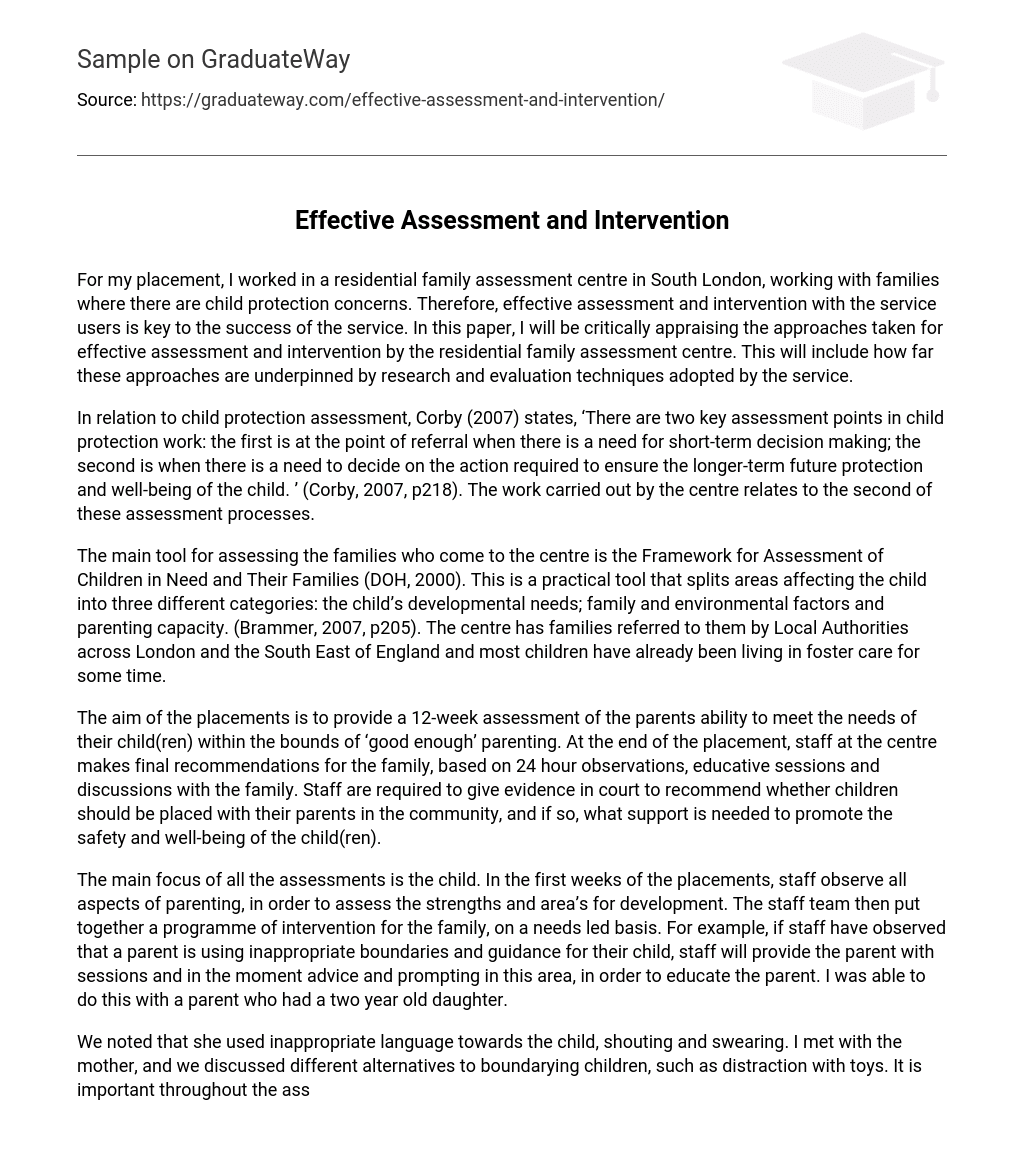During my placement at a residential family assessment centre in South London, I focused on supporting families who were facing child protection issues. It became evident that the centre’s effectiveness relied greatly on their capacity to assess and intervene with these families in an efficient manner. This paper intends to critically analyze the various approaches employed by the residential family assessment centre for this objective. Furthermore, I will assess how closely these approaches align with the research and evaluation techniques implemented by the service.
According to Corby (2007), child protection work involves two crucial assessment points. The first occurs during the referral stage, where prompt decisions must be made. The second point occurs when determining the necessary actions for ensuring the child’s long-term safety and well-being (Corby, 2007, p218). The activities of the center are linked to this latter assessment process.
The primary assessment tool used at the center is the Framework for Assessment of Children in Need and Their Families (DOH, 2000). This framework classifies different factors such as the child’s developmental needs, family and environmental factors, and parenting capacity (Brammer, 2007, p205). Families from Local Authorities in London and the South East of England are referred to this center. It should be noted that most children have already been in foster care for a considerable amount of time before coming here.
The purpose of the placements is to evaluate parents’ capability in meeting their child(ren)’s needs with ‘good enough’ parenting for 12 weeks. When the placement concludes, center staff offer final recommendations for the family based on 24-hour observations, educative sessions, and discussions. The staff must also present evidence in court regarding whether it is appropriate for the children to be placed with their parents in the community and, if so, what support is required to ensure the safety and well-being of the child(ren).
The main focus of all assessments is the child. During the first weeks of placements, staff observe all aspects of parenting to assess strengths and areas for development. Based on these observations, the staff team devises an intervention program tailored to the family’s specific needs.
For example, if staff notice a parent using inappropriate boundaries and guidance for their child, they will offer sessions and real-time advice to educate the parent in this area.
I had the chance to provide this support to a parent with a two year old daughter.
During a meeting with the mother, we addressed the issue of inappropriate language and cursing towards the child. We discussed alternative ways to establish boundaries with children, such as diverting their attention using toys. It is important to consider each family’s unique characteristics, including their background, culture, and cognitive abilities when evaluating and intervening with them. According to Connolly et al (2006), recognizing the importance of culture and being aware of our own cultural limitations is crucial in effectively working with and protecting children (Connolly et al, 2006, p16). Throughout my placement, I have been mindful of considering the cultural background of those I work with. By interacting closely with service users in residential settings, I have learned that understanding how someone’s culture influences their parenting requires not only researching their culture extensively but also directly discussing parents’ cultural backgrounds.
When planning effective interventions, it is crucial to take into account the cognitive abilities of service users. Most parents who visit the center have previously undergone psychological assessments that help staff understand their learning style and ability to retain information, advice, and guidance. Staff members use different techniques when interacting with parents based on the results of these assessments.
For instance, cognitive behavioral techniques may be used in educational sessions for parents who learn best through demonstration. During my placement, I had the opportunity to utilize this approach by teaching a mother how to properly prepare a bottle for her child. The session involved me demonstrating the process of making a bottle while explaining each step and its rationale, starting from sterilizing the bottles to warming it up for feeding. This technique has proven successful for numerous parents who are referred to our center.
At the 3, 6, and 10 week points during the 12-week assessments, reviews of the placement and progress are conducted. These reviews include the child’s social worker, guardian, keyworker, center manager, and other professionals involved in the case. This allows for a reflective analysis of the assessment and intervention’s effectiveness. Furthermore, after each placement, the staff team assesses the work done in relation to the outcome and contemplates what could have been done differently and what was successful.
In summary, the assessment centre emphasizes the importance of effective assessment and intervention in their work. Their approach involves working with each family based on their specific needs, culture, learning style, and ability. This enables the staff to conduct comprehensive and detailed assessments, and subsequently offer suitable interventions or referrals.
References
Brammer, A. ‘Social Work Law (2nd edition)’ (2007), Essex, Pearson Education Ltd.
Connolly, M. Crichton-Hill, Y. And Ward, T. ‘Culture and Child Protection: Reflexive Responses’ (2006), Jessica Kingsley Publishers, London.
Corby, B. ‘Child Abuse towards a knowledge base (3rd edition)’ (2007), Berkshire, Open University Press.





